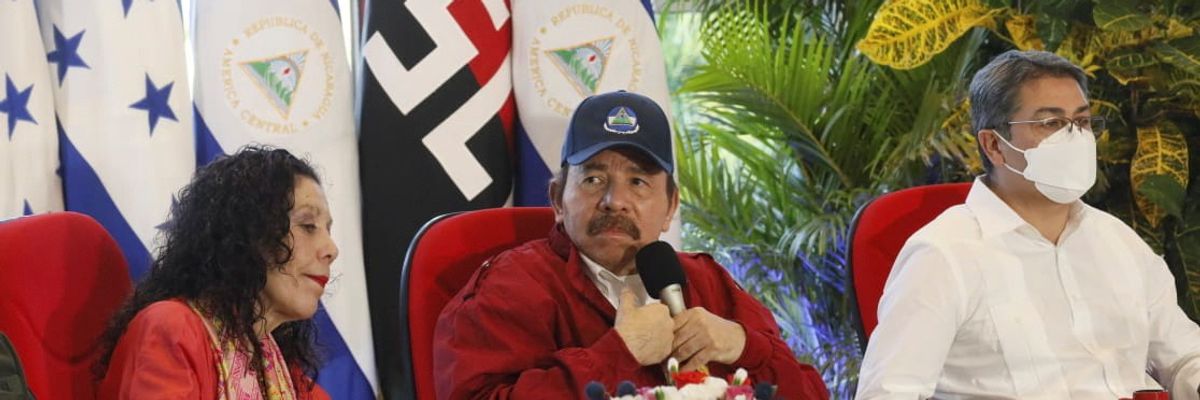To the surprise of absolutely no one, Nicaragua’s Daniel Ortega handily won his country’s November 7 presidential election. Ortega and his minions had systematically undermined and harassed his political opposition and crushed dissent for years; the outcome of the Potemkin electoral exercise, therefore, was a foregone conclusion.
A White House statement justifiably denounced the proceedings as a farce. “The arbitrary imprisonment of nearly 40 opposition figures since May, including seven potential presidential candidates, and the blocking of political parties from participation rigged the outcome well before election day. They shuttered independent media, locked up journalists and members of the private sector, and bullied civil society organizations into closing their doors.”
However, the Biden administration did not merely skewer the blatantly autocratic behavior of Ortega’s government. Washington responded just days after the balloting by imposing a new round of sanctions on Nicaragua’s leaders and pressing other U.S. allies to do the same. It is the same coercive strategy that the United States is pursuing toward Venezuela and has pursued toward Cuba for six decades.
When dealing with the issue of Nicaragua’s left-wing regime, too many policy activists and members of the news media succumb to competing illusions. One faction justifiably denounces Ortega for his corrupt, increasingly repressive, rule, but then prods Washington to tighten sanctions and take other, meddlesome steps in the name of restoring democracy to Nicaragua. Members of a smaller faction vehemently oppose that policy, and some (especially in the alternative media) even contend that Ortega is an admirable revolutionary figure who is being unfairly targeted by reactionaries in the United States bent on yet another regime-change campaign against anyone who dares oppose Washington’s imperial agenda.
Critics are right to oppose U.S. efforts to bring down Ortega’s government. Washington has amassed a thoroughly unsavory record during both the Cold War and the post-Cold War periods of trying to unseat regimes that U.S. leaders disliked. The underlying motives had little to do with the intrinsic characteristics of the governments in question. U.S. leaders had no problem supporting an array of “friendly dictators,” no matter their level of corruption or brutality. Unfriendly regimes, though, are another matter entirely. Opposing important aspects of Washington’s economic or security agendas always has been a reliable way to attract U.S. wrath.
Evidence of successful CIA-orchestrated coups against the governments of Iran, Guatemala, Chile and many others is now part of the historical record. More recent episodes, such as the U.S.-led wars against Iraq’s Saddam Hussein and Libya’s Muammar Qaddafi and the murkier effort to help unseat Ukraine’s elected, pro-Russia president in 2014 confirm that U.S. leaders have not lost their fondness for regime-change initiatives. Ortega’s government appears to be the latest adversary in the Biden administration’s crosshairs, just as it was during Donald Trump’s presidency.
Unfortunately, some opponents of U.S. regime-change initiatives seem to believe that they also have an obligation to whitewash the abuses of the leaders Washington has targeted. Some seem especially prone to engage in such behavior, and it has proved embarrassing at times. U.S. fans of Venezuela’s Hugo Chavez and Nicolas Maduro repeatedly have ignored, rejected, or excused mounting evidence of that government’s repression and corruption. A similar pattern has emerged with respect to attempts to defend Daniel Ortega’s increasingly flagrant autocratic rule.
Wise assessments must embody both realism and restraint. U.S. observers and policymakers need to be realistic and candid about Ortega and his associates; they are corrupt, Marxist thugs who have imprisoned political opponents, silenced an independent press, and made a mockery of Nicaragua’s democratic political system. There is no justification for whitewashing such an odious record.
However, pointing out that Nicaragua is now under the thumb of a nasty dictatorship must not become an excuse for Washington to impose more economic sanctions (which primarily hurt innocent civilians), much less for a CIA covert operation or a military intervention to unseat the regime. It is not the job of the United States to bring good governance to Nicaragua or any other foreign country. If the Nicaraguan people find Ortega’s dictatorial rule intolerable, it is their responsibility to remove him from power by whatever means they deem necessary.
Only if America’s own security is threatened might countermeasures, up to and including a full-fledged regime-change operation, be justified. The venerable Monroe Doctrine bars any neighboring state in the Western Hemisphere from becoming a de facto colony or military dependent of an outside power. If the outside power is hostile to the United States, such a development would be an especially grave concern to Washington.
Nicaragua has not yet stepped over that red line, and there are only sketchy reports that it might be flirting with doing so. Moscow openly boasts that its military aid is being solicited in several Latin American countries, including Nicaragua and Venezuela, and that statement is troubling. The American Enterprise Institute’s Michael Rubin even cites supposed “reports” that Russian military units are already operating in Nicaragua, although he offers no substantive evidence for his assertion. That allegation may well be nothing more than the latest cynical attempt by Russophobes and other hawks to use the Russian bogeyman as a pretext to validate Washington’s own aggressive moves.
If it is not, however, U.S. officials need to send a clear message to Managua that the United States will not tolerate Nicaragua becoming Moscow’s military client. At the same time, the Biden administration should offer assurances to Ortega that absent such unacceptable ties, Washington will refrain from meddling in his country’s internal affairs.
The United States should employ realism and restraint with respect to Nicaragua. Both elements are essential. As my Cato Institute colleague Doug Bandow correctly points out, “hating stupid interventions does not require loving communists.” Nor does loathing a communist dictator like Daniel Ortega require advocating another U.S. regime-change crusade. We can adopt a policy that is both principled and prudent.
















